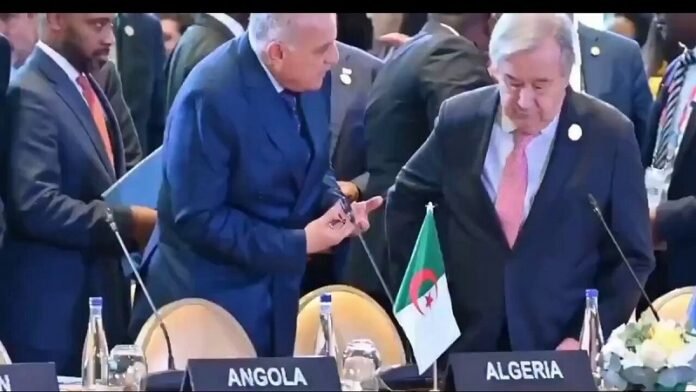The brief video clip showing Ahmed Attaf, Algerian Minister of State for Foreign Affairs, during the G20 summit in Johannesburg, is enough to signal that major developments are unfolding behind the scenes. Approaching UN Secretary-General Antonio Guterres, Attaf appeared tense, grim, gesturing as if protesting or blaming. This was no mere diplomatic moment. Today, with the official publication of Resolution 2797, it is clear that Algeria’s concern was well-founded.
A month-long wait… why?
The month-long delay in publishing the resolution is unusual in a conflict defined by procedural precision. The postponement reflects attempts to “soften” certain terms and delay final wording. Ultimately, the UN official site clarified:
self-rule is the basis of the political process, and the parties involved extend beyond just two actors.
From “two sides” to “all parties”: a linguistic shift, a political turning point
The most significant aspect in the Arabic text is the disappearance of “the two parties” or “parties to the conflict.” Instead, the word “parties” appears 13 times, clearly expanding the circle:
Morocco
Polisario
Algeria
Mauritania
This undermines the traditional Algerian narrative and makes Algeria a formal party to the conflict.
Algerian mediation… an initiative without basis
Days before publication, Attaf announced readiness to “mediate between the two parties” in a press conference on 18 November, presenting it as a regional and international responsibility. Rabat immediately ignored the offer. Resolution 2797 confirms: a party to the conflict cannot act as mediator.
From international dossier to Algerian internal issue?
When the country hosting, funding, and diplomatically shielding the Polisario becomes an official party, dynamics shift.
The implementation of real autonomy, as noted in the resolution, only includes those socially and historically linked to the Southern provinces, according to the 1974 Spanish census. Residents from Tindouf in Algeria, Mauritania, or Mali are automatically excluded, despite tribal affiliations.
Critical questions arise:
What will happen to them?
Where will they turn?
Who is responsible?
The answer points clearly to Algeria.
Next stage: withdrawing the file from the Fourth Committee
For the first time, Rabat seems to be preparing a strategic move: removing the Sahara file from the UN General Assembly’s Fourth Committee, responsible for non-self-governing territories.
Resolution 2797 provides leverage, noting broad support for Morocco’s autonomy plan since 2007. Procedurally, it is simpler than the Security Council: 97 votes suffice. Rabat has already begun expanding support among UN members, as seen in Nasser Bourita’s meetings in New York last September.
The King’s speech: consolidating a new reality
King Mohammed VI’s speech following the resolution reinforces the new equation:
Two-thirds of UN member states consider autonomy the sole framework for resolution.
Major economic powers recognize Morocco’s economic sovereignty over the Southern provinces and encourage investment.
Polisario: a purely Algerian problem
If the current path continues, the Polisario will no longer be a “partner” vis-à-vis Morocco, but a domestic Algerian issue, similar to other separatist movements hosted in countries.
The US, the leading supporter of the autonomy plan, now officially treats Algeria as a party to the conflict, as confirmed by visits and statements from American officials.
Conclusion: a new phase, new rules
Resolution 2797 is not just another Security Council number.
It is a turning point, potentially a complete rewrite of the conflict:
Algeria as a formal party
Polisario in a vulnerable position
Morocco diplomatically strong
Autonomy as the sole reference for any future settlement
A time when language changes, and with it, the political map.


